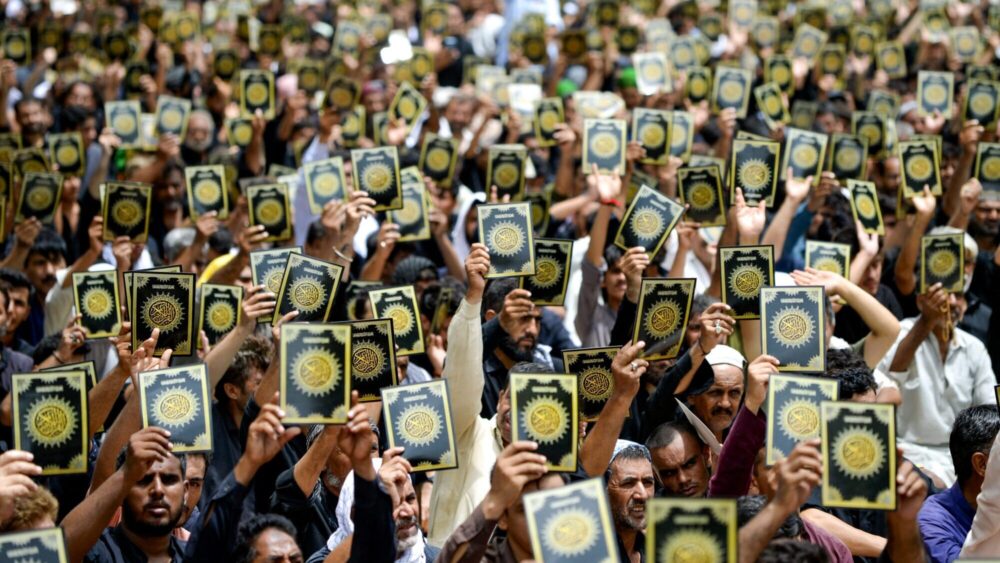
(Photo by Rizwan TABASSUM / AFP)
The decision taken by the left-liberal majority in the Danish parliament, the Folketing, late last week to ban public Quran burning has garnered sharp criticism from both domestic politicians and political leaders in neighboring Scandinavian countries, with many arguing the law represents a capitulation to Islamic thuggery.
Following a contentious debate on the floor of parliament on Thursday, December 7th, lawmakers voted 94-77 in favor of a law that criminalizes the so-called “inappropriate treatment” of religious texts. The three governing parties—the Social Democrats, the Liberals, and the Moderates—along with the Radical Left voted in favor of the legislation, while the rest of the opposition opposed it.
Anyone found guilty of violating the new law, set to take effect later this week, will face a fine or imprisonment of up to 2 years.
According to the legislation, “Anyone who publicly or intentionally for dissemination in a wider circle is guilty of inappropriate treatment of a writing that has significant religious significance for a recognized religious community, or an object that appears as such a writing is punished in the same way as in Section 110e”
Section 110e in the Criminal Code states:
Anyone who publicly insults a foreign nation, a foreign state, its flag or other recognized national or United Nations mark or the flag of the European Council, with a fine or imprisonment up to 2 years.
The law’s passing comes several months after its proposal and directly in response to a series of Quran-burning demonstrations that enraged Muslims across Scandinavia and the Islamic world.
In comments to The European Conservative, MP Mikkel Bjørn Sørensen of the conservative Danish People’s Party leveled a blistering critique of the ruling left-liberal alliance’s decision. He slammed lawmakers for submitting to “demands from dictatorial Middle Eastern regimes—ones that persecute women, homosexuals, and religious minorities—for the restriction of Danish freedom of speech and the extradition of Danish citizens for prosecution abroad.”
Instead of a very strong reaction and unambiguous distancing from this insane attempt to introduce Islamic legal principles in the West, the government has chosen to say that it takes two to start a conflict and makes concessions to aggressive and anti-democratic forces in the Middle East.
Denmark now bows to these regimes’ demands, while the countries in question continue their massive oppression and persecution. With this restriction, violent dark forces are rewarded for their use of violent tools. What the government is proposing will only open the door to even more demands and concessions. It is a shockingly banal truth that what one rewards, one gets more of. And the government’s willingness to reward terror, violence, and threats with concessions appears to be very large.
During the debate that preceded the legislature’s vote, Steffen Larsen, an MP for the opposition Liberal Alliance, accused the ruling coalition of cowardice and turning their backs on Danish ideals:
Who is standing here in front of me? Are you champions of the Danish desire for freedom and the spirit of the people, or are you cowards who reject the ideals as soon as the going gets tough?
Inger Stojberg, the leader of the Denmark Democrats, spoke similarly as she delivered her remarks. “History will judge us harshly for this, and with good reason… What it all comes down to is whether a restriction on freedom of speech is determined by us, or whether it is dictated from the outside,” the former immigration minister said.
“Now it’s 1-0 to the Islamists,” Støjberg continued. “Consider that the Swedes stand firmly for the rights of freedom, while the Danish government largely bows to the violent men’s veto.”
Outside of Denmark, in neighboring Sweden, reactions to the new legislation from leading politicians and others were more subdued.
Swedish Justice Minister Gunnar Strömmer (M), despite refraining from directly criticizing the Danish government, told TT Nyhetsbyrån that Sweden “does not want to go the same way as Denmark and outright ban Quran-burnings.”
“We must protect our freedom of expression. I don’t see that it is appropriate or that there is any wider support to go the Danish way,” he said.
Swedish journalist and former secretary of the Freedom of Expression Committee Nils Funcke lamented Denmark’s decision and expressed worry that it might be used as a reason to enact similar legislation in Sweden
“The Danish decision is sad and I am afraid that it may become an argument that we can get similar legislation here in Sweden,” Funcke began. “What has now been decided on in Denmark is in practice about a breach of religious peace law that was abolished in Sweden as early as 1970.”
Like Sweden, Quran burning, for the time being, remains legal in Norway. Earlier this fall, Norwegian Prime Minister Jonas Gahr Støre expressed his government’s strong opposition to the burning of Qurans but emphasized that it is not appropriate for Norway to ban Quran burning.
